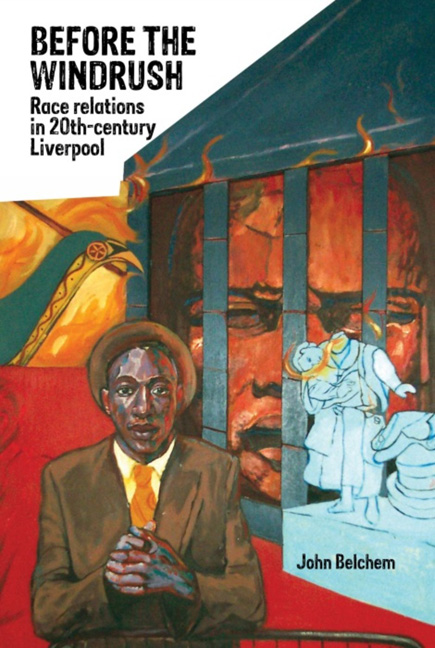Book contents
- Frontmatter
- Dedication
- Contents
- List of illustrations
- List of tables
- List of abbreviations
- Acknowledgements
- Preface
- Introduction: ‘The most disturbing case of racial disadvantage in the United Kingdom’
- Chapter One Edwardian cosmopolitanism
- Chapter Two Riot, miscegenation and inter-war depression
- Chapter Three Wartime hospitality and the colour bar
- Chapter Four Repatriation, reconstruction and post-war race relations
- Chapter Five Race relations in the 1950s
- Chapter Six 1960s: race and youth
- Chapter Seven The failure of community relations
- Chapter Eight ‘It took a riot’
- Sources consulted
- Index
Chapter Two - Riot, miscegenation and inter-war depression
- Frontmatter
- Dedication
- Contents
- List of illustrations
- List of tables
- List of abbreviations
- Acknowledgements
- Preface
- Introduction: ‘The most disturbing case of racial disadvantage in the United Kingdom’
- Chapter One Edwardian cosmopolitanism
- Chapter Two Riot, miscegenation and inter-war depression
- Chapter Three Wartime hospitality and the colour bar
- Chapter Four Repatriation, reconstruction and post-war race relations
- Chapter Five Race relations in the 1950s
- Chapter Six 1960s: race and youth
- Chapter Seven The failure of community relations
- Chapter Eight ‘It took a riot’
- Sources consulted
- Index
Summary
Large numbers of colonial migrants were drawn to the port city during the First World War, a time of critical shortage in the labour market, although claims in the local press that wartime ‘Dark Town’ Liverpool numbered at least 5,000 would seem somewhat exaggerated. Most ‘coloured colonials’ were engaged in the merchant marine, filling the vacuum after ‘alien’ seamen were recalled (or removed) to their own countries; some went into active military service; and others took the (otherwise rare) opportunity of moving into shore-based employment, mainly in oil cake mills, sugar mills and refineries, as well as munitions factories. There were some minor wartime tensions, for the most part prompted by the arrival of outsiders, white servicemen from the United States (encamped at Knotty Ash) or South Africa (recuperating in local military hospitals) who were accustomed to segregation. The uneasy transition from war to peace was to have a disastrous impact on labour and race relations amidst an economic reverse felt more acutely in Liverpool than elsewhere, a precursor of inter-war depression and decline. Wartime xenophobia, violently expressed (albeit somewhat indiscriminately) in anti-alien riots, found new expression in clashes with the resident ‘British coloured’ purportedly taking jobs (and women) away from demobilised local white workers denied the land fit for heroes promised by Lloyd George. 1919 witnessed race riots in a number of ports across Britain – London, Glasgow, Hull, Cardiff, Barry and Salford – but those in Liverpool were particularly intense, reflecting tensions which extended far beyond the local waterfront. As anxious Colonial Office officials realised, what happened in ‘riotous’ Liverpool, the gateway of empire, reverberated across the globe.
* * *
Wartime xenophobia was particularly pronounced in Liverpool, a seaport at the heart of the war effort. News of the sinking of Lusitania, ‘the pride of the port of Liverpool’, led to rioting and looting which, the Head Constable reported, soon extended beyond attacks on premises and individuals with Germanic names:
The mob was not particularly discriminating in its attentions, which were paid not only to Germans and Austrians, and the English husbands and wives of Germans and Austrians, but to Russian Jews, heathen Chinese and Irish and Italian Catholics whose wares excited the cupidity of the mob, or who, as was apparent in some cases, especially in the Jewish quarter, had incurred the hostility of trade rivals.
- Type
- Chapter
- Information
- Before the WindrushRace Relations in 20th-Century Liverpool, pp. 39 - 78Publisher: Liverpool University PressPrint publication year: 2014



